Episodes
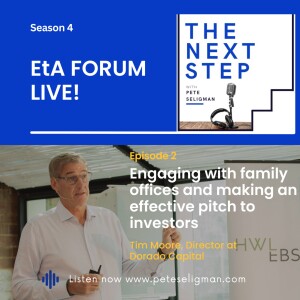
Thursday Feb 02, 2023
Thursday Feb 02, 2023
The opening keynote at the inaugural EtA Forum last year was Tim Moore, the Director of Dorado Property and Dorado Capital. This was a fascinating and far-reaching opening keynote that really set the tone for an excellent day, and I thought the insights that came out of the presentation would be particularly interesting for anyone looking to make acquisitions via search fund.
Tim not only has had experience in undertaking his own search, but has some exceptional insights into the operation and opportunity of the family office – a critical part of the search fund community. In his presentation he shares useful information on how entrepreneurs can engage with family offices, including where they prefer to deploy their assets, and what part of it is available for investment into companies (and how they think about that allocation for investment).
Later in the presentation he shares some exceptional and practical ideas on how to make effective pitches to investors like him, which is certainly something worth saving to refer back to as you practice and perfect your own pitch technique. Another interesting part of Tim’s presentation is a section where he describes the growth in funds. At the moment it’s coming from a smaller base, but we’re reaching the point where, by 2030, we could have as many as 30 funds launching each year, with $1.5 billion worth of capital available. This is not a small opportunity!
All-in-all, this was an excellent, tone-setting keynote which kicked the EtA Forum off with insight and panache, and, as you’ll see from the rest of the keynotes as well, made sure everyone left the event with valuable and actionable thoughts.
Connect with Tim: https://www.linkedin.com/in/tcsmoore/
Connect with Pete: https://www.linkedin.com/in/peteseligman/
Register for the next Eta Forum Event, download speaker presentations or watch the video of this episode here: https://www.peteseligman.com.au/eta-forum-sessions
What we discussed:
1:22 Pete introduces Tim Moore and his background.
3:28 Tim kicks his presentation off with the history of search funds – where it all started.
6:31 Next, Tim looks at the now, and discusses the amount of money invested into search funds and results.
10:54 Tim shares the key differences between the various types of investment pools.
12:22 Tim dispels some of the myths around what people think when they think of a “family office”.
13:56 Tim breaks down where the money in family offices go, and what form investments take.
21:42 To finish his presentation, Tim provides some valuable tips on pitching, and what family office investors want to hear.
26:50 The keynote concludes with an insightful Q & A session.
34:04 Pete wraps the episode up with some thoughts and analysis of Tim’s presentation.
Quotes
“Last night over a drink I got the impression that the searchers feel like they need more of the returns. We more-or-less say ‘it’s our money’, and they respond ‘it’s our business.’”
“A lot of the questions I get from people are along the lines of ‘what am I investing in?’ There are a lot of misconceptions about what family offices invest in, what their characteristics are, and so on.”
“People do have the impression that family offices are oak-panelled board rooms, and older, grumpy businesspeople. But of course, they come in lots of different flavours. You’re going to be speaking to a very broad range of people by age, stage level of advice, and so on.”
“On types of private equity in Australia, people talk so much about venture capital. They sometimes don't put it in the private equity basket, but from an asset allocation point of view. There's three categories of private equity and venture capital is obviously one of them.”
“You wouldn’t believe how often you see news in the Financial Review about things being bought by private equity, because it just drifts past your radar if you’re not paying attention to it, and then you forget about it, but it’s happening all the time below the radar.”
“It is extraordinary how you can have someone who has an encyclopedic knowledge of their business, great communication skills, and they come into a boardroom, where there is some magnetic attraction… and they just read through the deck line by line, which is a stifling and paralysing experience for the recipient. Whatever you do, do not simply read through your pitch deck.”
“You talk to a CEO of an ASX 100 company, and you ask them how things are with the management team and inevitably they'll say to you something like “look, I've got a bit of a concern about this. We're doing a conversion to SAP next year, my CTO has never done that, and we need to work out how to bolster the team there. But then you talk to a small $20 million revenue business in the suburbs and you ask them the same question and they’ll respond that they have everything covered with the four people on the executive committee. The point here is it's much better to talk about where there are gaps and how they're going to be remedied, and don’t ignore the negatives. Talk about how you’ll deal with them.”
“By and large, for confidentiality reasons, tax reasons, all sorts of things, family offices do tend to keep a pretty low profile.”
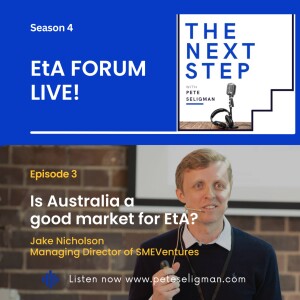
Thursday Feb 02, 2023
Thursday Feb 02, 2023
Search funds are still in their early stages in Australia. For that reason, one of the big questions that those of us that are early movers in the space have, is around what the opportunity really looks like. That can be difficult to define with limited data, and this is why Jake Nicholson’s presentation at our inaugural EtA Forum is so essential.
Jake has done an incredible job to collect data on the local market, build comparisons between what Australia and the (more mature) US market, and draw analysis on just how deep the opportunity is for Australian entrepreneurship via search funds. The results should be very encouraging to everyone. As Jake says, there are three primary “ingredients” in defining a healthy market for EtA. There needs to be companies to acquire, capital to do so, and the right talent to both make the acquisitions and then run the companies as CEO. The data suggest that across two of those three metrics, Australia is primed to boom.
Australia has many companies that fit the ideal profile of companies to acquire through search. Furthermore, while getting funding isn’t guaranteed, there is an appetite to invest. It’s only the third “ingredient” – the talent question – where we need some attitudes towards entrepreneurship to change. Australia does have some ground to make up there, both in terms of our social outlook on entrepreneurship, and within our education system. Nonetheless, despite the current roadblocks, there is good reason to be bullish there, too.
Overall, Jake’s presentation was deep and interesting, and instrumental to the EtA Forum being such a successful event. In fully breaking down and articulating the opportunity, Jake was able to present a vision for search acquisitions that should appeal to anyone with an entrepreneurial spirit.
Connect with Jake: https://www.linkedin.com/in/jakenicholson/
Connect with Pete: https://www.linkedin.com/in/peteseligman/
Register for the next Eta Forum Event, download speaker presentations or watch the video of this episode here: https://www.peteseligman.com.au/eta-forum-sessions
What we discussed
1:08: Pete introduces Jake and his background.
4:10: Jake starts his presentation on the research of search funds by defining the methodology of the research and defining search funds.
6:00: Jake highlights a research study by Stanford that found high rates of returns with search funds over the past 30 years.
7:10: On the question “why has it taken so long for search funds to get to this side of the world?”
9:28: Now, on to the big question: “is Australia a good market for EtA?” There are three primary ingredients for making a healthy market for EtA, so does Australia have them?
10:36: A summary of the common criteria that searchers use when looking for companies to acquire.
17:17: Finding capital – is there enough capital to fund search fund entrepreneurs in Australia, and where does it come from?
26:53: Finally, talent. Simply put, are there enough searchers in Australia?
31:30: Pete provides an analysis and further insights around Jake’s presentation. Key
Quotes
“If you believe that you are an average searcher, then according to the Stanford study, you have about a 48 per cent chance of making money, which is a much (much) greater percentage than your chances of coming out on top with a startup.”
“The status of search funds today in Australia is that it is still early days, but the trend line is moving in the right direction.”
“For a healthy market for EtA, we need companies to buy, capital to fund the searchers and their acquisitions, and high-calibre CEOs to run the search, buy the business and operate the business as a CEO.”
“Most acquisitions to date have been in services, you don't see a whole lot in construction or manufacturing.”
“In the typical search funds story, the seller is a retirement age founder or owner, who doesn't have a succession plan and likes the idea of transitioning the business to a hungry younger operator who will carry on the legacy of that business and take it to new heights.”
“When I launched SME ventures, I noticed that Australians are a very friendly bunch. You would accept coffee meetings with me and give me very encouraging words, but the only people who wrote cheques were the ones that had some prior tie to the space.”
“There are several investors throughout the world who are private equity executives and have spent their lives investing in these bigger businesses and seeing all the smaller businesses with very attractive value creation opportunities. But, because of the structure of their firm, they can’t do something about the opportunities.”
“A search fund doesn't see consumer discretionary or raw materials, activity and private equity as a threat, typically.”
“Early-stage investment activity is even greater in Australia than then in the US as a percentage of GDP. And this to me signals an appetite a willingness of investors to invest in high risk and entrepreneurial activities, which is part of what we need and one of the one of the big questions about new markets, and has been a frequent question about Australia is are investors too conservative to back ventures like this? This data suggests that that might not be the case.”
"I’ve been very lucky to partner with a very few talented entrepreneurs in Australia, but I currently see talent as the bottleneck to the growth of the EtA and search fund ecosystem.”
“One thing that’s important is the correlation in people's perceptions of high status to being a successful entrepreneur. There's a higher correlation in the idea that entrepreneurship is a good career choice in the US than in Australia, and it’s actually quite significantly higher, by about 10 per cent.”
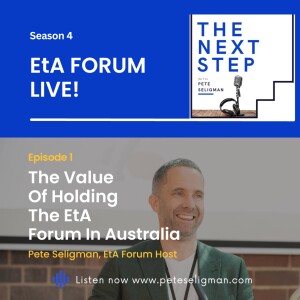
Thursday Feb 02, 2023
Thursday Feb 02, 2023
Last year we brought you the inaugural EtA Forum, and were thrilled with the response. The idea was that we would give our growing and dynamic part of the Australian investment and acquisitions space a chance to come together and share some great insights, and the response was overwhelming.
To help further spread the insights that came from that event, the content from the presentations will form the core of this season of the Next Step Podcast. As you’ll see, this introductory episode is really meant as a statement of record. It covers some of the housekeeping that came at the start of the very first session of the event, and some quick insights on the purpose and value of the forum. This is a shorter episode, but I thought it was important to share the full context of the EtA Forum, to preserve its value for future audiences.
As I mention in the introduction, investors and advisors alike need to understand that entrepreneurship through acquisition is understood as a viable pathway towards business ownership and success in Australia. It’s a niche, certainly, but it’s also one that more Australian entrepreneurs are finding success with, and it will continue to grow as an opportunity in the years ahead.
Enjoy this podcast, and the rest in the series, and we hope to see you at the next EtA Forum, later this year!
Connect with Pete: https://www.linkedin.com/in/peteseligman/
Watch this recording, download speaker presentations or register for the next EtA Forum here: https://www.peteseligman.com.au/etaforum
What we discussed:
00:00 – Introduction to the podcast.
01:09 – ETA is a pathway to business ownership.
02:13 – Presentation from the EtA Forum begins.
06:13 – Our space is a new market.
08:07 – The core purpose of the EtA Forum – Networking.
Quotes:
“It’s important for investors, both domestic and offshore, to know that this is a viable asset class and viable investment.”
“It’s important that advisors know that this is a great niche for them to build their own business so that our searchers and investors have all the support they need.”
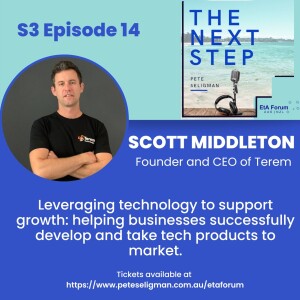
Wednesday Sep 14, 2022
Wednesday Sep 14, 2022
This year, the Australian EtA and Search Fund community is looking forward to its first big event for the region. The EtA Forum (www.etaforum.com.au) will be held in Manly Beach in Sydney, on Friday 16th September.
In today's episode of the next step, I speak to Scott Middleton, who is the founder and CEO of Terem. Terem is a technology based business that provides tech product development support for big to small businesses across Australia and New Zealand, all the way from strategy to product to engineering and everything in between.
Scott and his team have recently developed a JV structure whereby they partner with businesses typically small to medium type businesses around building technology that supports the growth of those businesses. And as such, has come across the search model in the last six to 12 months and has been really engaged, so much so that he's become an excellent supporter of the community and will be sponsoring the EtA Forum this month.
He'll also be speaking at the event, on a panel about the various forms of search and will be giving us a description of the JV model that he and his team are bringing to market that leverages some elements of the search model, partnering with searchers to buy great businesses.
Scott has got a range of experience from building his own computer game years and years ago through working on technology projects with VCs startups, high growth businesses, all the way through to government organizations like the ATO. So he's got a wide range of experience. And in some parts of the conversation, I find it hard not to end up down all sorts of rabbit holes. So it was a great conversation and I hope you enjoy it.
www.etaforum.com.au
Connect with Pete : https://www.linkedin.com/in/peteseligman/
Connect with Scott : https://www.linkedin.com/in/scottmiddleton/
What we discussed:
03:15 Scott gives us an insight into his background and how he got where he is today.
05:07 Scott tells us about when he was a kid, how he built and sold a game that was sold globally.
08:59 Scott discusses his experience dealing with corporate culture, big business, the bureaucracy in approval structures & processes compared with the agility of the entrepreneurial spirit.
17:03 Scott tells us how he has found the search space so far and what things resonate most in relation to the search model and search community.
24:14 Pete asks Scott if he has started to see an increase in opportunity in relation to the JV model he is building.
Quotes:
I've been an engineer working on some large projects, and I kind of bring all that together. I've also lost a lot of money. I've probably lost about a million dollars of my own money on let's call it - they weren't a bad idea - though just poorly executed is how I would put it. I have to learn decisions the hard way. Because I'm playing with my own money, not someone else's.
That's really my background and why Terem came about. I just saw a real need to help organizations build tech products better, and help their teams perform better.
The exciting thing about those big organizations is that there's really big opportunities attached to them. We've launched products with Qantas, for example, that have moved the needle on their share price, and gone to millions of people in the first week.
We can push boundaries more, which we think is kind of necessary to make things work and make decisions faster and learn faster.
When I'm investing, I'm looking at the stock market saying I'm investing in Company X, who's listed, because I believe in what they're doing in their market, not because I want them to be a VC.
The way that we've observed to do it is not so much through an innovation lab. An innovation lab in a business is going to make incremental change on the edges, where you get disruptive outcomes in small teams, isolated from the day to day, freedom to operate.
Get them outside the building, let them run separately, don't put red tape around them, let them do what they're going to do for their specific purpose, and you'll get much better success.
What I like about the search community is it just kind of vibes with my approach, which is that really methodical considered, take out your downside, give yourself options, build your cash flow.
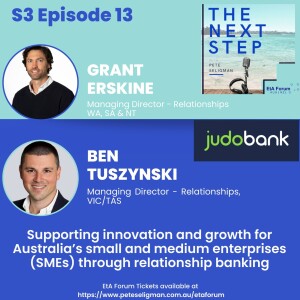
Tuesday Sep 13, 2022
Tuesday Sep 13, 2022
This year, the Australian EtA and Search Fund community is looking forward to its first big event for the region. The EtA Forum (www.etaforum.com.au) will be held in Manly Beach in Sydney, on Friday 16th September.
On this episode of The Next Step podcast, I speak to Grant and Ben from Judo bank. Judo has kindly offered to sponsor the ETA Forum, which is coming up next month in Manly. And it's exciting to have an opportunity to chat to them because I get their perspective on what they're seeing in the SME market, both in terms of acquisitions, debt funding and overall business operations in 2022.
Judo was founded only about five years ago, and has grown rapidly into this market space which was effectively under loved by the bigger banks in the Australian market and they're providing a really bespoke approach to SME lending and cashflow lending, which is critical to the success of Search Funds and EtA in this marketplace. Without that debt package, it's almost impossible to make the search acquisitions and the search businesses work as investments and be successful for their operators.
We're looking forward to seeing them and their team at the EtA Forum in September. Please stay tuned as we count down the days and be sure to yell out if you have any questions or comments to offer, so we can make the EtA Forum a great event for all involved.
www.etaforum.com.au
Connect with Pete : https://www.linkedin.com/in/peteseligman/
Connect with Grant : https://www.linkedin.com/in/grant-erskine-9ba38a24/
Connect with Ben : https://www.linkedin.com/in/ben-tuszynski-96746912/
Learn more about Judo Bank : https://www.judo.bank/
What we discussed:
03:13 Ben tells us what’s new at Judo and what they are seeing in the market.
09:40 Ben and Grant discuss the SME market in Australia and what is the most common thread amongst this customer base.
13:34 Ben & Grant give us their perspective on acquisition funding of businesses that are in the small to medium size.
19:35 Grant talks about what he’s learned so far about search that makes it a good fit for a bank like Judo, and tells us about the characteristics of the model that resonate with him.
27:76 Grant & Ben tell us about their partnership with the EtA Forum.
Quotes:
But we always had the end goal in sight, which was really to build a business that became or was on its pathway anyway to becoming Australia's most trusted SME bank. . And that's what it's really all about, is servicing those SME customers, who just don't get the love from our competitors in the market.
The most important thing to us is who we lend our money to. It's that resilience piece, that is the most common thread that we see across this customer base.
And there's also a significant amount of innovation that you see in the SME market. And what we find is, small to medium sized businesses are able to innovate, and then eventually one day they might get bought out by a large corporate.
But actually come and talk to us, and we'll discuss how we might be able to structure something up that works for everybody. And I think that's one of our advantages.
We think SMEs are the lifeblood of this, not just the Australian economy, but also for innovation and growth, which we're really excited to support.
Over the last 12 to 24 months, and everyone's been speaking about this for probably years, if not a decade, is this transition of baby boomers out of their businesses into whether retirement or semi retirement and the need for this transition of wealth to happen.
So we're seeing a community rather than an individual by a business, and the ideas and networks in order to bring that business to success, and then just the quality of information and analysis that sits behind the deal.
There's no cookie cutter approach to this part of the market. And I think it's such a key thing that needs to be understood by a bank or banker is that you need to really take a bespoke approach to every single transaction because the searcher will be different.
We're not plugging it into an algorithm to let the computer make a decision for us. We're putting highly experienced bankers in front of our customers, or brokers or whatever it might be, to ask the right questions, get hopefully good answers, and then make a decision.
There's going to be lots of really good businesses whose ownership lifecycles are coming to the end. And they're about to be bought out by these great entrepreneurs that are going to take their business to the next level. So we're really just really excited to go meet and support the ecosystem that's been built out.
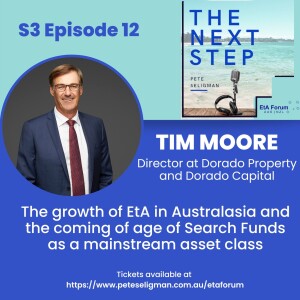
Monday Sep 05, 2022
Monday Sep 05, 2022
This year, the Australian EtA and Search Fund community is looking forward to its first big event for the region. The EtA Forum (www.etaforum.com.au) will be held in Manly Beach in Sydney, on Friday 16th September.
In this episode of the next step, I speak to Tim Moore, who is the Director of Dorado capital. Tim originally was a self funded searcher back in the early 2000s. And then after exiting the business that he originally bought, has then moved on to invest in a range of activities, including property infrastructure and small business. More recently, he's been an active investor in the search fund market in Australia and also internationally.
Recently, Dorado also raised the first Australian funds focused on search funds, and they raised $10 million with capital and have already deployed a proportion of that over the last 12 months.
At the EtA Forum in September, Tim is going to deliver the keynote speech in which he will provide an update on the state of play of Search in Australia and New Zealand, giving us his perspective as an active investor in the marketplace and what he sees now and into the future.
I had a great time catching up with Tim, to learn a bit about what he's been up to in the last couple of months and have a chat about what we each expect everyone to be able to get from the day we spend together at the EtA Forum in a couple of weeks time.
Please stay tuned as we count down the days and be sure to yell out if you have any questions or comments to offer, so we can make the EtA Forum a great event for all involved.
Tickets available at: www.etaforum.com.au
Connect with Pete : https://www.linkedin.com/in/peteseligman/
Connect with Tim : https://www.linkedin.com/in/tcsmoore/
What we discussed:
03:23 Tim tells us what he has been seeing in the search market recently.
06:32 Pete asks Tim where he sees the balance struck at the moment between investments, investors available to fund and entrepreneurs available to execute.
10:21 Tim discusses what he is seeing in relation to new entrepreneurs that might be coming to market in the next few months.
14:19 Tim gives his take from an investor lens on what more can be done in the Australian market to make sure that there is domestic support.
18:58 Tim tells us what we can expect from his session at the EtA Forum and what he hopes will be the key takeaways.
Quotes:
I think things have progressed so much in the last two years, the last year, that it's a great cause for optimism. But the reality is, this is still a very fledgling asset class. And there's a long journey to go.
It'll be a long time before we do start to scrape the bottom of the barrel in terms of businesses available to buy. It feels like there's still a long way to go there.
The investor market domestically here was struggling to keep up because there just wasn't the knowledge about the asset class or the appetite, really. Whereas now I feel like we've got quite a buoyant domestic investor group that's keen to try and find searchers to back.
If you think about the period, not very long ago, when some of those people were raising money, they were going and sitting down with family offices who were licking their chops, having had venture cap funds, and share market portfolios performing like rocket ships, and congratulating themselves about how smart they were. A lot of that's changed.
I think that we're starting to have the pandemic move slightly into the rearview mirror. You either get started now and have a good crack at it before Christmas. But if you really don't get your act together in the next month or two, don't waste your time in November, December, because you probably won't get anyone's attention.
If you don't want to Big C suite job in a big major organization, if you're not walking into a major family business your family owns, and if the whole VC tech world sounds a bit risky, search is the absolutely logical place for you to hit.
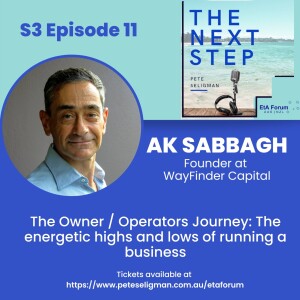
Tuesday Aug 30, 2022
Tuesday Aug 30, 2022
This year, the Australian EtA and Search Fund community is looking forward to its first big event for the region. The EtA Forum (www.etaforum.com.au) will be held in Manly Beach in Sydney, on Friday 16th September.
In this episode, I speak to Ak Sabbagh. Ak is Director and Coach at Beckon Business, Co-Founder of Second Squared and Managing Director and Co-Founder of WayFinder Capital Managers.
Ak works extensively with entrepreneurs and business owners in the Mid-Market Enterprise (MME) sector across Australia. For over 20 years his work has primarily focused on sustainable business growth, alignment of commercial strategy with partnership/shareholder aspirations, structuring for growth (including setting up of boards and governance processes), acquisitions, and succession (MBO, outright sale, etc).
Ak co-founded Second Squared in 2018 to develop the ecosystem and accelerate the development of the Searcher Community in Australia. He mentors and advises many of the existing and imminent Searchers throughout their searches and acquisitions.
Please stay tuned as we count down the days and be sure to yell out if you have any questions or comments to offer, so we can make the EtA Forum a great event for all involved.
Tickets available at: www.etaforum.com.au
Connect with Pete : https://www.linkedin.com/in/peteseligman/
Connect with Ak : https://www.linkedin.com/in/akram-sabbagh/
What we discussed:
03:24 Ak tells us how the year been so far his ventures in the search fund
09:38 Ak gives us his view on the current building blocks for search and where he sees the challenges and opportunities
17:00 Pete asks Ak what we can expect to hear in his session at the EtA Forum
20:35 Ak discusses the importance of the human factor in the owner/operator’s journey
Quotes:
It never ceases to surprise me how much that cultural element translates because even when I'm speaking to people in South America, or Europe, or, or Africa or wherever, there are those common threads around that openness, that abundance mindset, and that willingness to share.
We had to keep reminding ourselves that we were one year into something that was 30 years old, in a market which has a huge cultural focus on entrepreneurship that's different to the one in Australia. But having said that, I think we're starting to see those bits of infrastructure coming together. Certainly the searcher community itself is growing.
The other side of the equation is that business is a human experience. We often go to the numbers as indicators of what's happening. But rarely do we get the chance to go to the human experience and really tap into the energy of the human experience, that could actually potentially indicate to us what's going on in the business, probably even more so than the numbers.
And how can you link that to emotion and the energy of that time? And if you're aware of that, how can you leverage that energy for your betterment? And suddenly, they're sitting on this business five years, six years down the track, which is, and we hear it all the time, if it wasn't for the staff, and the clients wouldn't have been a wonderful place.
That human experience, that is really the piece that's missing. The solution won't come from the numbers, it will only come from talking about it with a real human being at the other end. So it's that relational piece, which is really, really powerful and important. The important thing to understand about payback is that generally, the mistake that's made is people take out too much of the business, and they forget to reinvest.
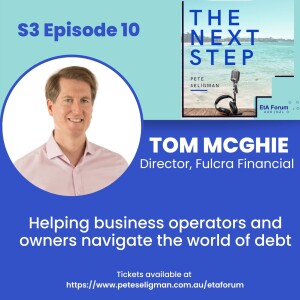
Tuesday Aug 23, 2022
Tuesday Aug 23, 2022
This year, the Australian EtA and Search Fund community is looking forward to its first big event for the region. The EtA Forum (www.etaforum.com.au) will be held in Manly Beach in Sydney, on Friday 16th September.
In this episode, I speak to Tom McGhie from Fulcra Financial, an advisory firm focusing on providing Debt Solutions for Australian businesses and their owners. I've had the pleasure of working with Tom on a couple of deals over the last couple of years. And one of the things that I find really valuable about the process and approach that he takes is the ability to translate from the business owner and operator to the bank.
Tom has been involved in the search community as it's grown and has been a supporter of a number of transactions on that front. He will also be joining us at the ETA forum next month in September in Manly will be sitting on a panel and contributing his expertise and his experience to that conversation on the day.
Please stay tuned as we count down the days and be sure to yell out if you have any questions or comments to offer, so we can make the EtA Forum a great event for all involved.
Tickets available at: www.etaforum.com.au
Connect with Pete: https://www.linkedin.com/in/peteseligman/
Connect with Tom: https://www.linkedin.com/in/tommcghie/
What we discussed:
03:13 Tom gives us an overview into his background and career to date and how he came to help clients navigate the world of debt
10:16 Tom tells us how he first came across deals in the search fund and eta space and how that has evolved over the last couple of years.
15:25 Pete asks Tom about what he is seeing coming to the table at the moment and what he sees as the main characteristics of those deals from a debt perspective.
20:07 Tom discusses how extra layers of credit value are resonating inside the banks.
Quotes:
Capability across the industry has shifted a lot, the focus of how banking works has shifted a lot, arguably, positively or negatively. But ultimately, the navigation from a customer's perspective has not gotten any easier. And I have to say that there's no one in there trying to do a bad job or trying to make life difficult for a customer or a business owner.
There's definitely that interplay of real life experiences required to understand how things practically pay play out in the real world.
The absolute first element to these transactions, which is so important is, if I kind of think back to sort of our five C's kind of framework, which, I guess is quite a common framework, but essentially, character being the top right, we're dealing with somebody that has got good experience.
That ability to be coached, seek advice, seek input, is the fundamental foundation of what makes for us a bankable transaction.
We want in the world of debt, to look back in history and say, that's doable, it's repeatable. And it's going to happen again, and simply you structure debt based on proven business models that essentially are all going to repeat and can be repeated, but most importantly, will repeat.
It does really start with that commercial element and lining up, then all the other pieces around it, not limited to what I've just described, to make a transaction really work. So really thinking about how is this business going to perform in a downturn, perhaps that we might have, or, ultimately that they're going to grow this business in all weather.
But I think it's going to be really interesting over the next few years to see how that appetite the combination of appetite and capability from the banks to be funding these deals, which kind of sit in that gap like they're too big to have a simplistic approach, which can work very, very well for much smaller deals.
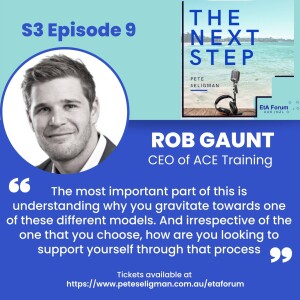
Monday Aug 15, 2022
Monday Aug 15, 2022
This year, the Australian EtA and Search Fund community is looking forward to its first big event for the region. The EtA Forum (www.etaforum.com.au) will be held in Manly Beach in Sydney, on Friday 16th September.
In this episode I speak with Rob Gaunt, CEO of ACE Training. Rob started his career selling photocopiers and worked his way up to COO. He then obtained an MBA at Macquarie Graduate School of Management before launching his search for a company to acquire in partnership with SMEVentures, a platform for search funds in Australia.
At the EtA Forum next month, Rob is hosting a panel that will focus on the various “flavours” of EtA that are available to both Entrepreneurs and Investors alike. He will have representatives from a few common models and another from a novel approach to the task. It should be a really interesting session that provides an opportunity for the audience to hear directly from people who have walked each path and learn more about the structure that could suit them best.
Please stay tuned as we count down the days and be sure to yell out if you have any questions or comments to offer, so we can make the EtA Forum a great event for all involved.
Tickets available at: www.etaforum.com.au
Connect with Pete : https://www.linkedin.com/in/peteseligman/
Connect with Rob : https://www.linkedin.com/in/rob-gaunt/
What we discussed:
03:49 Rob tells us how things are going at ACE Training a year into the acquisition
08:24 Rob discusses the approach to the panel session “The Flavours of Search” coming up at the EtA Forum
15:35 Pete & Rob talk about what may influence an investor's decision around the structure they follow
17:30 Rob discusses why a certain model may resonate with an investor more than another
18:48 Pete & Rob tell us what the Search community can expect from the EtA Forum in September
Quotes:
The big shiny thing that everyone wants to chase is growth and how do we scale this but sometimes the real value is in setting that foundation first. So you've got that springboard to then go and achieve what you want to do.
There is no right or wrong way to do this. There are just different ways and people's strengths and backgrounds match up to different components of that.
It's not only what structure do I think might suit me, but it's also what structure might suit me in this market as opposed to next year's market?
Inevitably, everyone wants to know, how did you raise the capital? It's the first question every searcher asked. And it is, in my view, absolutely, the wrong question to be asking If you've got a good idea, or you've got a good kind of approach, the capital will come.
I think that the most important part of this is understanding why you gravitate towards one of these different models. And irrespective of the one that you choose, how are you looking to support yourself through that process, and, you know, each model has slightly different components to it. And you need to fill those in in different ways.
Someone who really understands their core capabilities and the way that they want to go about it, it's going to stand out from someone who hasn't done that work.
We all looked at the problem differently. And we all got elements of it wrong. And we learned more from what we got wrong, than what we got right.
It's nice for us to be able to have this type of conversation in a public forum and say, hey, you know, here are some of the things that we learned and answer some of those questions. It's fantastic to see the model doing so well in Australia. I feel very lucky to be part of it.
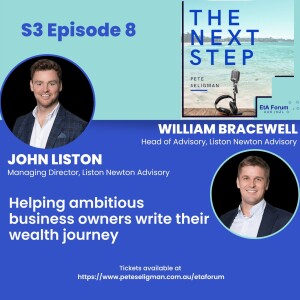
Tuesday Aug 09, 2022
Tuesday Aug 09, 2022
This year, the Australian EtA and Search Fund community is looking forward to its first big event for the region. The EtA Forum (www.etaforum.com.au) will be held in Manly Beach in Sydney, on Friday 16th September.
In this episode I speak with John Liston, Managing Director and William Bracewell, Head of Advisory at Liston Newton Advisory (LNA), who have kindly offered to support the EtA Forum with sponsorship. It is great to have them on board, given they are such dedicated supporters of the Search and EtA community in this region.
This conversation was a good opportunity to hear a bit about the background of LNA and also their perspective on the SME market in Australia, in particular those deals and businesses backed by the Search Fund structure. All great deals and business endeavours will have a network of reliable advisors sitting on the sidelines providing the support, guidance and invaluable advice required to make good progress. LNA is one of those advisors whose clients benefit from years of deep experience and a wide ranging perspective on small and medium business operations.
Please stay tuned as we count down the days and be sure to yell out if you have any questions or comments to offer, so we can make the EtA Forum a great event for all involved.
Tickets available at: www.etaforum.com.au
Connect with Pete: https://www.linkedin.com/in/peteseligman/
Connect with John: https://www.linkedin.com/in/john-liston-6b8bb147/
Connect with William: https://www.linkedin.com/in/william-bracewell-74257870/
What we discussed:
02:51 We learn about Liston Newton Advisory and how they help business owners on the growth journey.
06:31 John tells us how he got involved with the search community.
12:45 William talks about the key issues that arise when buying, owning and operating a small business in Australia.
14:43 John & William discuss the opportunities and challenges to look for from a growth perspective.
24:30 John talks about the importance of getting the new structure right in the first 100 days.
Quotes:
We trace that back to why as a business owner do they get into business. Generally, it's because they want to build their own wealth, they want to build their family's wealth.
There is this gap in the middle where there are some growing small mid tier businesses that really need good advice and good support. And it's kind of that juggle between whether or not they can afford to either get it in house or pay for the big guys, or whether or not they need to kind of manage it themselves through the process.
You have to get your data right, get your ducks in a row. And it's a one to two year journey you should be going on before you even think about taking it to market.
You want to really understand what sort of sale you want it to be. So as an asset sale, is it a share sale? So yeah, it really starts from just the first thinking, I want to get into this, and then you sort of build from there.
I think a lot of CEOs and people that come on board with the owners, they really don't understand the level of workload that it takes to own a business.
I find a lot of businesses that we work alongside with, they've gone in with this massive theory of I'm going to buy it today. And it's going to be two, three times the size within 12 months. And I mean, that sort of does lead to a lot of decisions that probably aren't for the best in the business world. And so the first six months is yet again, just trying to understand how the business is run and making sure that you can get things in place.
Can I get the data I want as soon as I want it, because, often you've probably bought it at a decent multiple, because a lot of that stuff is not quite as efficient and not quite as modern as it should be. You've got to update the systems and the software and the processes, but you've also got to find out, okay, who's gonna step up now within the business and actually kind of take control this entire function, because often, they've sort of been able to fall back on the outgoing vendor who's done a bit of everything.
So you've got, you know, the incoming CEO who's kind of bought this business, and now they're, they're just bought themselves a job, essentially. So you're taking a step back, and saying don't worry about pushing that growth as high as you can, in that first 100 days, just take that step back.
It’s understanding if there's a particular problem, or there's a particular service that one of our clients needs, who can we trust?

